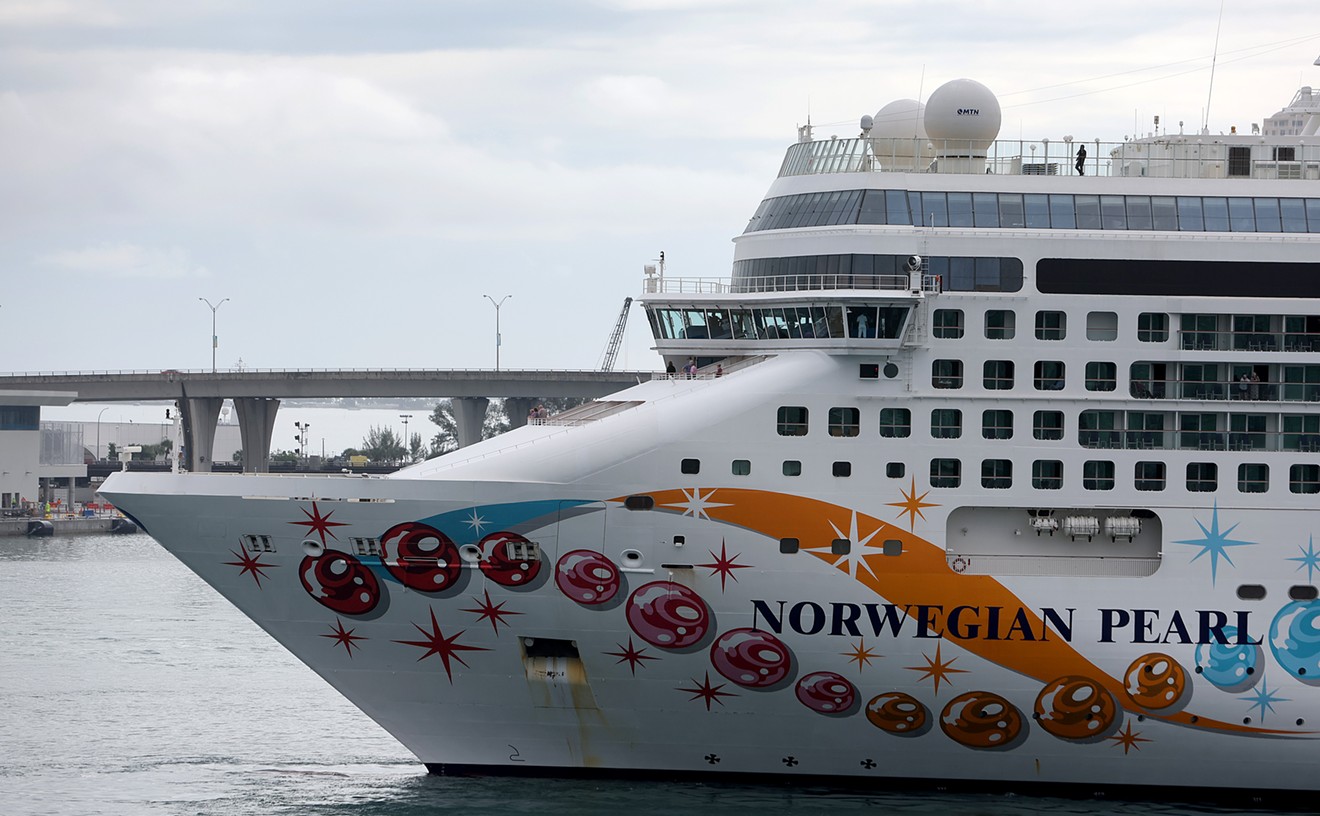"By firing one of our strongest activists, Primitivo Salcedo, Terner's is once again breaking the law," the flyer stated, referring to the federal law that prohibits employers from firing workers for lawful union activities. Dominguez and Romano believed they were exercising their First Amendment right to free speech by informing other Terner's employees about the dismissal. So when a City of Miami police officer appeared and told them that they were about to be arrested, Dominguez laughed.
"What about the U.S. Constitution?" Dominguez asked. Ofcr. Paul Rodriguez responded by pulling out a copy of the City of Miami Code. According to Ordinance 37-28, passed by the Miami City Commission in 1967, "It shall be unlawful to distribute any handbill, dodger or other advertising to pedestrians upon any street or in any park or other public place in the city or to passengers in any bus."
Minutes later Dominguez and Romano found themselves sitting in the back of Rodriguez's patrol car, charged with a misdemeanor and faced with a maximum punishment of up to 60 days in jail and a $500 fine.
Dominguez was stunned. In his twenty years of labor organizing he has been arrested countless times, but never for passing out flyers. "I told Rodriguez that we live in a country where you are supposed to be able to express yourself freely," he recalls.
Dominguez and other UNITE organizers had been leafletting outside Terner's for three weeks, remaining on public property so they could not be charged with trespassing. A few days before the arrest, Dominguez had even given his business card to a police officer passing by. "That's the way I work," Dominguez says, explaining that he tries to maintain a good relationship with law enforcement.
Dominguez called the police two days after the arrest to let them know UNITE was planning a rally in front of Terner's. Scott Weingarden, a lawyer who is representing Dominguez and Romano on the misdemeanor charges, attended. "The day I was there the people who ran the factory were begging the police to arrest everyone," Weingarden remembers. "They even showed one of the officers a copy of the ordinance, but he told me he wasn't going to honor it."
Robyn Blumner, executive director of the American Civil Liberties Union of Florida, was surprised that the law hadn't been repealed. "The Constitution clearly protects the First Amendment rights of people to distribute information and literature in the public domain. In some ways this [ordinance] is an infringement on the rights of the common man. Most people don't have the means to get their message across by buying television time or by taking an ad out in the newspaper. But anyone can stand on a street corner or go to a public park and hand out a written message."
In fact, the city clerk received a memo on March 16, 1995, written by Alyce Whitson of the Municipal Code Corporation, which publishes the code for the city. The memo states that Ordinance 37-28 "will be deleted" from future editions because giving a handbill to a person "may not be prohibited as protected by the First Amendment." The memo does not state who had ordered the deletion.
Miami City Attorney Quinn A. Jones III did not return phone calls seeking an explanation for the amending of the code. Chief Deputy Clerk Sylvia Lowman says the ordinance is not included in the revised code, which took effect on April 21.
A spokesman for the City of Miami Police Department, who was unaware of the change in the law, compared the ordinance to other obscure prohibitions on activities such as spitting on a sidewalk or cross-dressing. Strictly speaking, police officers are responsible for enforcing any law that is included in the code book, he pointed out. "There are a lot of laws that you haven't heard of that are only enforced because of citizens' complaints," explains Ofcr. Joe Cruz. "On a misdemeanor the officer has the right to make an arrest or not. There's nothing illegal about [selective enforcement]. Each officer has the power to make that decision."
But union activists complain that Rodriguez abused his discretion in order to help the owners fight the union, and they question his relationship with the management of the factory.
As a courtesy to local police, Terner's maintains an office marked with a large City of Miami decal where patrol officers can complete paperwork, have a cup of coffee, and make phone calls. According to Primitivo Salcedo, the worker who was fired, Officer Rodriguez regularly stopped by and chatted with the owners.
Marcia Terner, one of the factory owners, did not respond to a request for comment.
Organizers estimate there are about 125 workers at Terner's. They labor in a variety of occupations, from cutters and sewing machine operators to people who assemble the final product. Employees earn between $4.75 and $6.75 per hour. Aside from one week's paid vacation, they do not receive any benefits.
Salcedo, a mechanic who had worked at Terner's for 24 years, and his wife Iris Colon heard about UNITE from a friend who had been involved in a successful struggle to unionize a local nursing home. After Salcedo and Colon learned that they too had the right to form a union, they spread the word to other Terner's employees, visiting them at home or calling them after work.
Salcedo and Colon estimate that the union was supported by about half of the workers by the time Salcedo was abruptly fired. (The union must sign up 30 percent of the work force in order to petition the National Labor Relations Board [NLRB] for an election.) The 41-year-old Puerto Rican says he was not given any explanation for his dismissal. "They just came up to me and said, 'You know, this is your last day,'" Salcedo recalls.
The union has filed charges with the NLRB against Terner's for gross violation of labor law. "It is illegal for a company to try to interfere with employees who are exercising their right to form a union," asserts Monica Russo, Florida director of UNITE. Salcedo's dismissal and the subsequent arrest of the two union organizers are the latest scare tactics Terner's management has used to fight the union, she says. According to organizers, workers had also been told that the factory would be forced to move its operations to Costa Rica if the union was brought in. Supervisors allegedly told employees that they had videotaped a union meeting and that the union had turned over copies of their sign-up cards, identifying those employees who were seeking membership. "It's really sickening, but intimidation is an effective anti-union tactic," Russo comments.
Since UNITE launched a campaign to unionize South Florida nursing homes last year, its leaders have become accustomed to employers who call the police. Even the Archdiocese of Miami, which owns a nursing home that was successfully organized, appealed to law enforcement when UNITE started distributing leaflets to their employees.
"Calling the police ain't no joke, especially if workers are from Haiti or Nicaragua [where union members have been killed]," Russo observes. "It's used to send a very serious message." But she adds that the police had never attempted to arrest an organizer for leafletting until the incident occurred at Terner's. (In the past thirteen months UNITE has successfully organized eleven nursing homes and two factories. The union's organizing campaign was chronicled in the March 14, 1996, New Times cover story "United They Stand.")
Russo says the arrest of Dominguez and Romano has so poisoned the atmosphere that UNITE has postponed calling an election at the factory and is instead concentrating its efforts on a legal battle regarding labor law. If the NLRB finds that Terner has violated federal law in opposing the union, it can force the company to recognize UNITE without an election. "We're not giving up, and the workers are not giving up," she declares.










